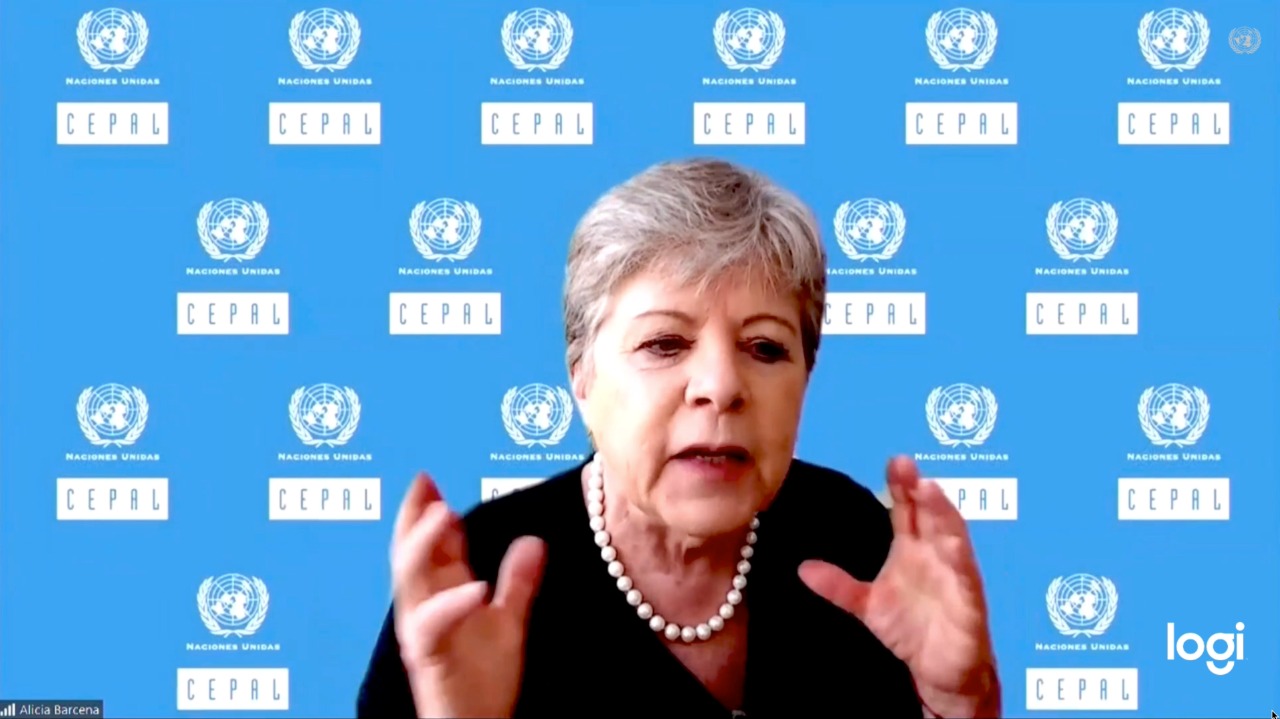infographic
Fighting illicit trade flows, tackling tax non-compliance and establishing mechanisms to alleviate the debt of the most vulnerable nations are key actions for expanding developing countries’ fiscal space amid the current crisis stemming from the COVID-19 pandemic, Alicia Bárcena, Executive Secretary of the Economic Commission for Latin America and the Caribbean (ECLAC), stressed today during a high-level event with Heads of State and Government held during the 76th United Nations General Assembly.
ECLAC’s highest authority was one of the main speakers at the Meeting of Heads of State and Government on Jobs and Social Protection for Poverty Eradication, convened by the UN Secretary-General, António Guterres, and the International Labour Organization (ILO). On this occasion, the Secretary-General’s policy brief entitled Investing in Jobs and Social Protection for Poverty Eradication and a Sustainable Recovery was presented.
The event was inaugurated by António Guterres and the Prime Minister of Jamaica, Andrew Holness, in his capacity as co-convener of the Financing for Development in the Era of COVID-19 and Beyond Initiative (FfDI). Guy Ryder, Director-General of the ILO, set the scene for the meeting’s thematic framework.
In her remarks, Alicia Bárcena indicated that the fight against tax evasion and illicit financial flows, which are critical barriers to domestic resource mobilization in Latin America and the Caribbean, would significantly further efforts to expand fiscal space. “We are talking about $325 billion dollars a year, and this will require international cooperation because the resources from all this evasion go to certain other countries,” she said.
She indicated that the illicit financial flows arising from the manipulation of international trade in goods are estimated to have reached $85 billion dollars (1.6% of GDP), and many of these flows are linked to products that are part of global value chains, which points to possible abuses related to transfer pricing.
She added that it is also urgently necessary to expand the universe of multinational companies to which a minimum corporate tax of 15% can be applied, and to achieve a better distribution of those resources between developed countries and developing nations.
“In addition, debt alleviation is one of the major things that we need, especially in the Caribbean. That is why ECLAC is proposing to alleviate 12% of that subregion’s total debt to create a Caribbean Resilience Fund,” she added.
With regard to the recently approved allocation of the IMF’s Special Drawing Rights (SDRs), Bárcena welcomed the measure and emphasized that it needs to be accompanied by voluntary recycling of the instruments from developed to developing countries. She further indicated that the creation of a trust fund for middle-income countries should be explored in which development banks and regional financial institutions can act, since the Latin America and Caribbean region is the most highly indebted in the developing world and today must spend 59% of its exports of goods and services on debt service payments.
“There are some key issues that we must address because ours is a region that faces significant structural gaps, inequality, underfunded health systems, as well as accumulated gaps in social protection. These include informality and inequality, which mainly affect women and young people,” Bárcena concluded.
Alicia Bárcena participated in Panel 1 of the meeting, along with Kristalina Georgieva, Managing Director of the International Monetary Fund (IMF); David Malpass, President of the World Bank Group; Mathias Cormann, Secretary-General of the Organisation for Economic Co-operation and Development (OECD); Mauricio Claver-Carone, President of the Inter-American Development Bank (IDB); Muhammad Sulaiman Al Jasser, President of the Islamic Development Bank; Akinwumi A. Adesina, President of the African Development Bank; Achim Steiner, Administrator of the United Nations Development Programme (UNDP); and Mafalda Duarte, CEO of the Climate Investment Funds.



